Iran Captures Freestyle Team Title on Final Day of Junior Asian C'ships
Sunday, July 14, 2019 - 13:49 By United World Wrestling Press
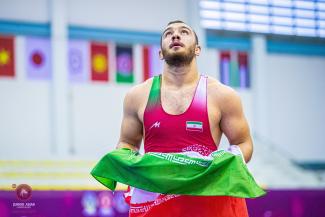
CHON BURI, Thailand (July 14) - After winning the Greco-Roman team title on Wednesday, Iran captured the freestyle team title on the final day of the Junior Asian Championships in Chon Buri, Thailand.
For the second straight day, Iran won three gold medals in freestyle, bringing the gold-medal haul to six over the two-day freestyle competition. Iran finished with 201 points, 55 points ahead of runner-up Japan. India finished third in the team standings with 129 points.
Iran's gold medalists on Sunday were Mahdi SHIRAZI (61kg), Ali Reza ABDOLLAHI (92kg) and Amir ZARE (125kg). 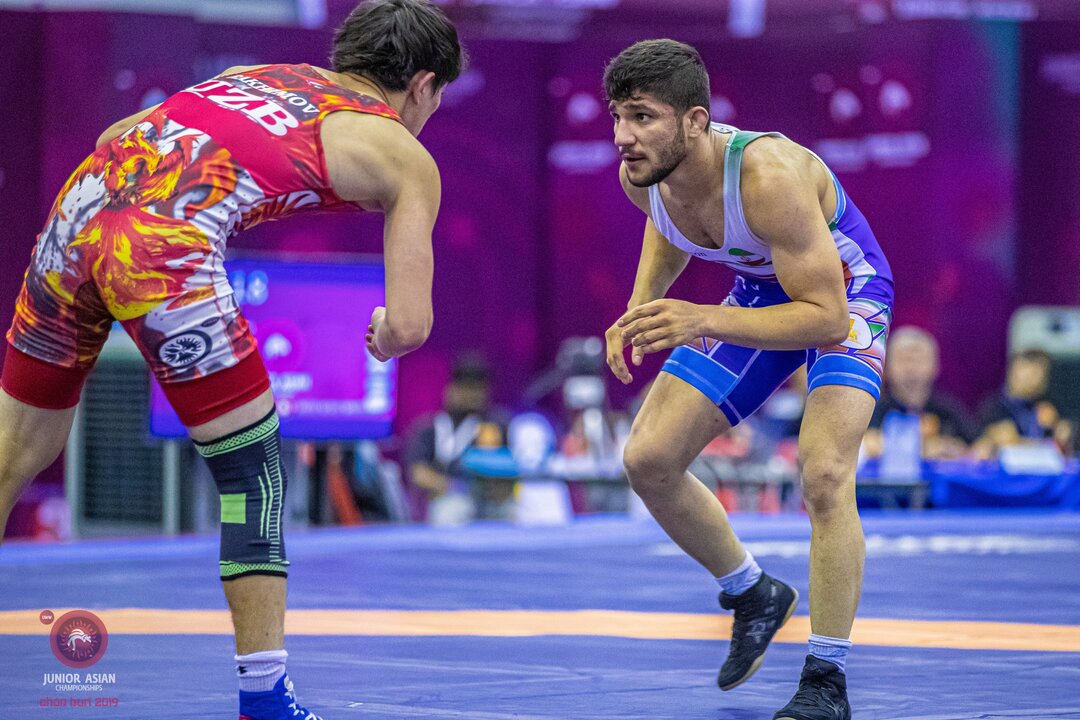 Mahdi SHIRAZI (IRI) claimed a gold medal at 61kg. (Photo: Sachiko Hotaka)
Mahdi SHIRAZI (IRI) claimed a gold medal at 61kg. (Photo: Sachiko Hotaka)
Shirazi used a big first period to pace him to a 6-0 victory over Nodir RAKHIMOV (UZB) in the gold-medal match at 61kg. After scoring his first point from the activity clock, Shirazi picked up a four-point, feet-to-back takedown to build his lead to 5-0. He would add an additional point off a caution in the second period to win by six. 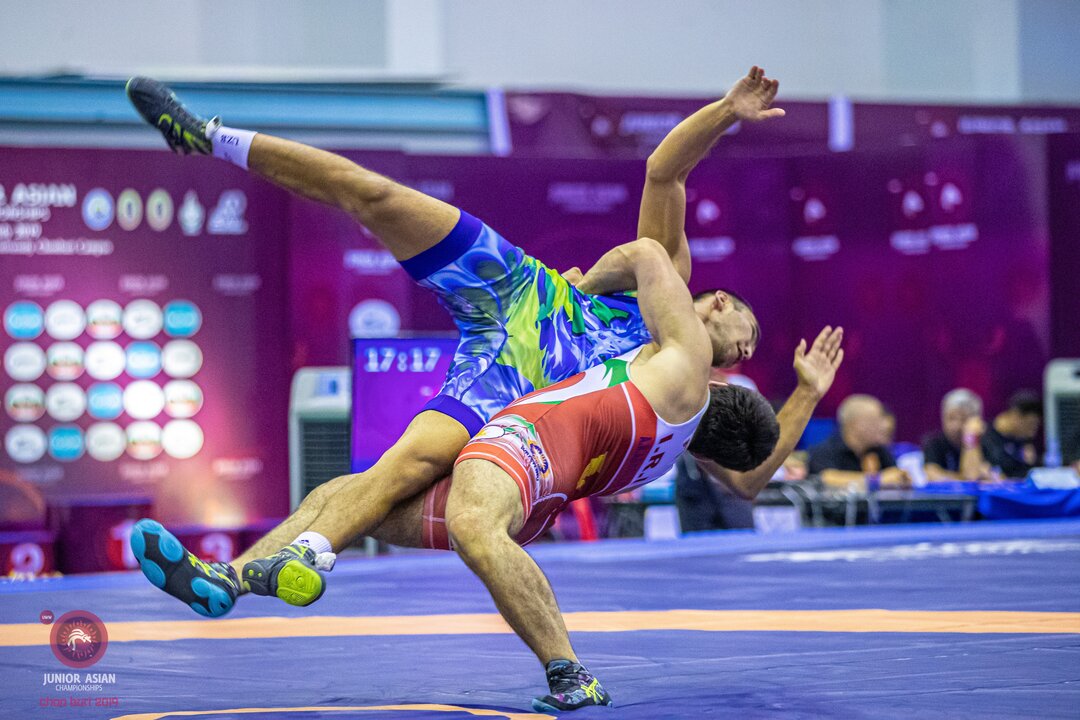 Ali Reza ABDOLLAHI (IRI) scored with a big throw in the finals. (Photo: Sachiko Hotaka)
Ali Reza ABDOLLAHI (IRI) scored with a big throw in the finals. (Photo: Sachiko Hotaka)
Abdollahi, a cadet world champion, was dominant in the 92kg finals, beating Ajiniyaz SAPARNIYAZOV (UZB) by 10-0 technical superiority in the first period. After scoring with a step out, Abdollahi executed a throw midway through the first period to score four points and go up 5-0. A short time later, he picked up a four-point, feet-to-back takedown. The call was challenged and upheld, giving the Iranian the gold medal. Last year Abdollahi won gold at the Cadet Asian Championships.
Zare, also a cadet world champion, cruised to the gold medal at 125kg by beating Buheeerdun BUHEEERDUN (CHN) 11-1 in the finals. Zare got on the scoreboard first with a step out before Buheeerdun responded a short time later with a step out of his own to take the lead on criteria. But the Iranian dominated the rest of the way. He scored a couple takedowns to go up 5-1 and then used a gut wrench to turn Buheeerdun twice and build his lead to 9-1. Zare fired off a single leg late in the first period for another takedown, which closed out the technical superiority. 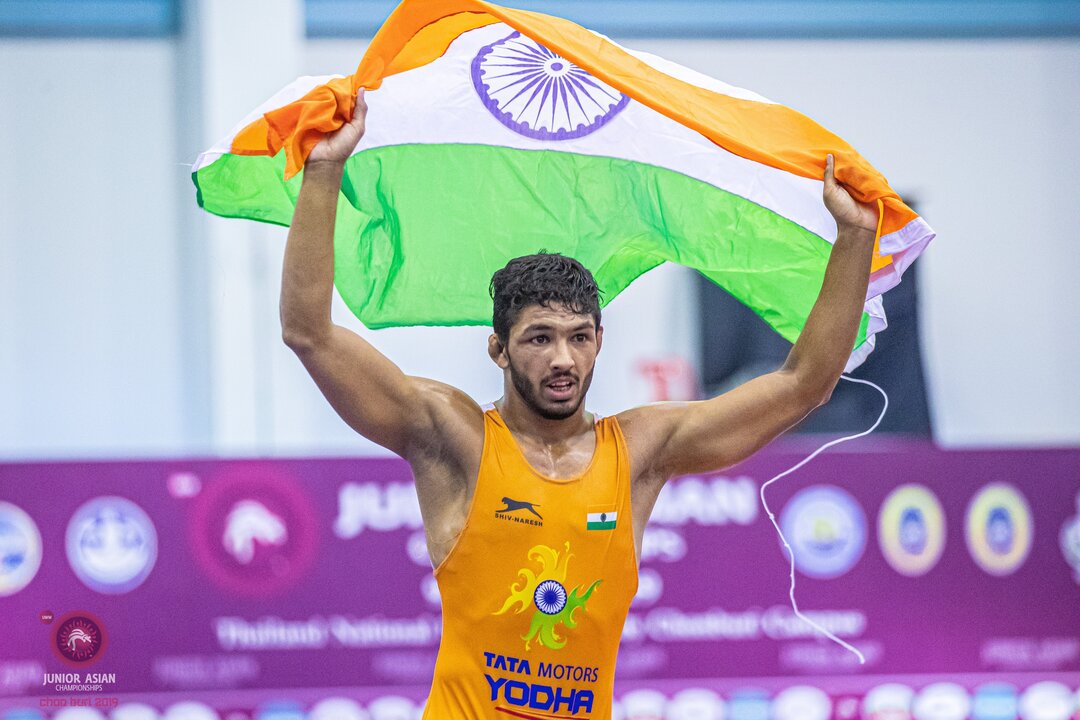 Parveen MALIK (IND) won the gold at 74kg. (Photo: Sachiko Hotaka)
Parveen MALIK (IND) won the gold at 74kg. (Photo: Sachiko Hotaka)
Parveen MALIK (IND) hung on to defeat Tu AHEIYOU (CHN) 4-2 in the gold-medal match at 74kg. He adds a junior Asian gold to his collection after winning a cadet Asian gold in 2017. Malik scored all four of his points in the first 30 seconds of the match off a four-point, feet-to-back takedown. Aheiyou battled his way back into the match, but ultimately fell short.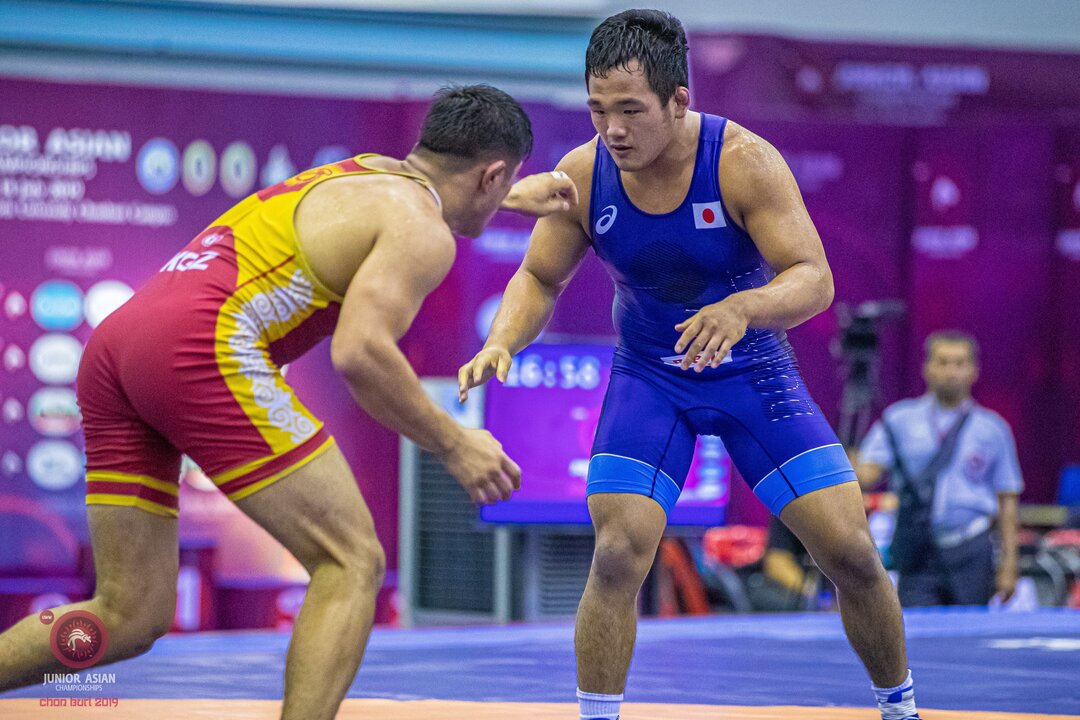 Tatsuya SHIRAI (JPN) defeated Baisal KUBATOV (KGZ) in the 86kg finals. (Photo: Sachiko Hotaka)
Tatsuya SHIRAI (JPN) defeated Baisal KUBATOV (KGZ) in the 86kg finals. (Photo: Sachiko Hotaka)
Tatsuya SHIRAI (JPN) edged Baisal KUBATOV (KGZ) 2-1 in the finals at 86kg. Shirai scored first off the activity clock and then with a step out to take a 2-0 lead at the break. Kubatov found his first point in the final 15 seconds, but Shirai would hang on to win.
RESULTS
Final Freestyle Team Scores
GOLD - Iran (201 points)
SILVER - Japan (146 points)
BRONZE - India (129 points)
Fourth - Kazakhstan (111 points)
Fifth - Korea (111 points)
61kg
GOLD - Mahdi SHIRAZI (IRI) df. Nodir RAKHIMOV (UZB), 6-0
BRONZE - Ikromzhon KHADZHIMURODOV (KGZ) df. Kodai OGAWA (JPN), 8-4
BRONZE - Adil OSPANOV (KAZ) df. Putawan SENAWAT (THA), 10-0
74kg
GOLD - Parveen MALIK (IND) df. Tu AHEIYOU (CHN), 4-2
BRONZE - Yu FUJITA (JPN) df. Jinwoo MOON (KOR), 11-0
BRONZE - Amirhossein KAVOUSI (IRI) df. Bayarsaikhan TSEDENBALJIR (MGL), 11-0
86kg
GOLD - Tatsuya SHIRAI (JPN) df. Baisal KUBATOV (KGZ), 2-1
BRONZE - Govind KUMAR (IND) df. Seyedabolfazl HASHEMIJOUYBARI (IRI), 8-4
BRONZE - Jeongwoo PARK (KOR) df. Teng ZHAO (CHN), 3-0
92kg
GOLD - Ali Reza ABDOLLAHI (IRI) df. Ajiniyaz SAPARNIYAZOV (UZB), 10-0
BRONZE - Haksu BAN (KOR) df. Enkh Orgil BEEJIN (MGL), 4-2
BRONZE - Symbat SULAIMANOV (KGZ) df. Bekzat URKIMBAY (KAZ), FALL
125kg
GOLD - Amir ZARE (IRI) df. Buheeerdun BUHEEERDUN (CHN), 11-1
BRONZE - Vishal VISHAL (IND) df. Gan Erdene SODBILEG (MGL), 7-0
BRONZE - Bakdaulet OSSERBAY (KAZ) df. Shogo MUTO (JPN), 10-0


 Participants look on doing the education courses held in Croaita during the final week of May. (Photo: United World Wrestling)
Participants look on doing the education courses held in Croaita during the final week of May. (Photo: United World Wrestling)
Share your thoughts.
Comments